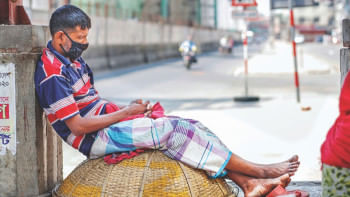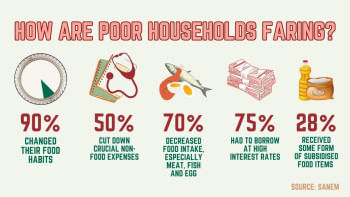Why do our food producers go hungry?

Despite worldwide efforts to promote food security, global hunger is on the rise, driven by natural resource shortages, climate change, and armed conflicts. According to a Food and Agriculture Organization (FAO) study this year, every night, 828 million people around the world go to bed hungry. The "Global Report on Food Crisis" stated that 258 million people worldwide are suffering from acute food insecurity. A recent report by the UN found that more than 52 million Bangladeshis are currently experiencing food insecurity, with 18.7 million people acutely food insecure.
Hunger is not only a political or economic problem, but also an alarming gender issue, as women account for two-thirds of the world's hungry. 150 million more women than men are hungry, despite being primarily responsible for everything related to food, from seeding to serving, in a large portion of the world.
According to the FAO, women generate between 60 and 80 percent of food in most developing countries. Studies show that, rural women account for two-thirds of low-income livestock caretakers globally. Over 70 percent of livestock work is done by women in India. 70 percent of Africa's food is produced by women. In Bangladesh, women are active in all work related to food production, including tilling the fields, post-harvest chores, cultivating vegetables and kitchen gardens, breeding chickens, milking cows, farming sheep and goats, etc.
In Bangladesh, mothers often give a large portion of food to their sons from childhood and encourage their daughters to make food sacrifices so that men can eat more. After marriage, wives are expected to save the leg piece or big fish head for their husbands and not eat before the men. If there is a food shortage due to poverty or inflation, women will reduce or skip meals to ensure that their husbands and children have enough to eat.
Surveys conducted in a variety of nations have shown that women spend 85-90 percent of the time spent on home meal preparation, yet they account for about 70 percent of the undernourished population globally. According to UNICEF, around 1.2 billion girls and women worldwide suffer from vitamin and other key nutritional deficiencies.
In Bangladesh, women are more likely to suffer from hunger and malnourishment than men due to their significantly lower financial independence. Approximately 1.7 crore reproductive-age women are underweight, accounting for one-third of all married women, increasing the risk of complicated births. Over half of all women in this country are anaemic, with the majority of cases being nutritional in nature.
Although it may seem trivial to discuss nutrition when simply getting enough food to survive is a challenge, access to nutritious food is essential for all people. Women's hunger has not only immediate consequences for women themselves, but also potentially lifelong implications for the next generation.
Women have different physical and hormonal needs than men, and therefore require more specific vitamins and minerals. For example, women need more calcium after menopause and women who menstruate need to replenish iron. Folic acid is also essential for women to prevent neural tube defects in their infants.
Poverty, unpaid work, lack of property, low social status, inflation, and other factors all contribute to women's hunger and malnutrition. Women are generally underpaid for their work, earning just 77 cents for every $1 earned by men. They own less than 20 percent of the world's land. As a result, women's hunger and rates of underfeeding have worsened during this time of rising prices.
In addition, various patriarchal practices make women more likely than men to go hungry or undernourished worldwide. In Bangladesh, mothers often give a large portion of food to their sons from childhood and encourage their daughters to make food sacrifices so that men can eat more. After marriage, wives are expected to save the leg piece or big fish head for their husbands and not eat before the men. If there is a food shortage due to poverty or inflation, women will reduce or skip meals to ensure that their husbands and children have enough to eat.
In our society, men are usually given preference at meals. For example, when we host guests, our mothers often cook all day in front of the fire. However. at mealtime, our fathers and male relatives typically sit at the table with the guests, while the women who cooked all day are often ignored. No one asks them if they have eaten, or if there is enough food for them. In most cases, at the end of the meal, there is only something left at the bottom for the women, or nothing at all.
Studies have also shown that women order and eat less food when dining with men than when dining with women. Even if a woman is offered good food somewhere, she often feels guilty about eating it alone. This tendency is a result of existing gender roles and social norms. To make such sacrifices, to eat less, and to feed the good to men, women live almost their entire lives eating less. As a result, they suffer from malnutrition all year round. Therefore, hunger and malnutrition are clearly sexist issues.
Today is World Food Day, a reminder that we must take action to ensure that everyone has access to nutritious food. Hunger is a major obstacle to development, and it is especially devastating for women. If we are to achieve the second Sustainable Development Goal of "Zero Hunger," we must prioritise the needs of women. Because if we can reduce the number of hungry women, the world's overall hunger will be reduced automatically.
Nahida Nishi is an NGO worker and a feminist writer.
Views expressed in this article are the author's own.
Follow The Daily Star Opinion on Facebook for the latest opinions, commentaries and analyses by experts and professionals. To contribute your article or letter to The Daily Star Opinion, see our guidelines for submission.

 For all latest news, follow The Daily Star's Google News channel.
For all latest news, follow The Daily Star's Google News channel. 











Comments